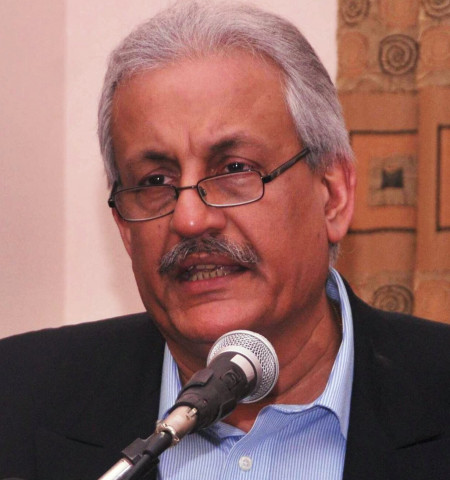‘Teaching students about Ranjeet or Bhagat Singh would not harm Pakistan’
Rabbani blasts centrists, establishment for trying to undo devolution.

‘Teaching students about Ranjeet or Bhagat Singh would not harm Pakistan’
Teaching students about Ranjeet or Bhagat Singh would not harm Pakistan in any way. A distorted version of history is no longer relevant in the post 18th amendment era.
This was said by Senator Raza Rabbani, the architect of the 18th constitutional amendment, on Friday at the roundtable workshop titled “Education in Federally Organised Countries”. The workshop was organised by the Centre for Civic Education Pakistan (CCEP) and the Forum of Federations in collaboration with German Foreign Office.
He blamed the establishment and “some elements within the ruling elite” of trying to circumvent the devolution process.
In an hour-long speech, the senator spoke out his heart, saying the implementation commission faced a strong opposition from several quarters in the second phase of the devolution of ministries to the provinces.
Senator Rabbani spoke of a “dangerous trend” that may rollback spirit of the 18th constitutional amendment, which, he warned, would be detrimental to Pakistan.
Referring to a recently-held national conference on syllabi and curriculum, he said the federal government or the Planning Commission had no constitutional or legal authority to organise such a conference after the 18th amendment that empowered provinces to exclusively deal with the issue of syllabi and curriculum.
“We must ensure the rollback is stopped. You have the political history of state suppression, state disappearances, state murder and torture. You have the history where the provinces were denied the rights to promote their languages,” Senator Rabbani said.
He deplored the fact that several people with centrist mindset strongly opposed the process of devolution and provincial autonomy which is a blatant attempt to violate the constitution. “Don’t forget there was a huge trust-deficit between the provinces and the centre which still persists.”
“Pakistan was created to become a welfare state, but the purpose was changed and the country became a garrison and national security state,” he said.
Eminent educationalists, senior education officers, chairmen textbook boards, vice-chancellors of major universities from the four federating units and Islamabad, and research scholars attended the conference.
In favour of a decentralised setup
Earlier on Thursday, Supreme Court Bar Association President Asma Jahangir, speaking at a CCEP conference on world democracy day, said political parties are national assets. “I don’t say the political parties are perfect. There are a lot of faults. [But] it doesn’t mean we eliminate them. We must raise our voice for the reforms of political parties.”
Dr Jaffar Ahmed of Karachi University talked about the post 18th amendment scenario and rejected the arguments that the decentralisation would undermine Pakistan’s sovereignty.
“Why do we think that provinces would act against the country? Why we consider the provinces are anti-Pakistan? Pakistan was created by the provinces,” he argued.
Renowned journalist Iftikhar Ahmed said the military dictators always claimed to get rid of corrupt politicians, but instead promoted moral and financial corruption.
Dr Khadim Hussain, Managing Director of Baacha Khan Trust Education Foundation, said the 1973 Constitution reflects the aspirations of the people and a “collective will” is required to uphold its supremacy.
Eminent analyst and journalist Raza Rumi said it was important to cultivate the relations between citizens and the Constitution in order to progress as a democracy.
Published in The Express Tribune, September 17th, 2011.



















COMMENTS
Comments are moderated and generally will be posted if they are on-topic and not abusive.
For more information, please see our Comments FAQ